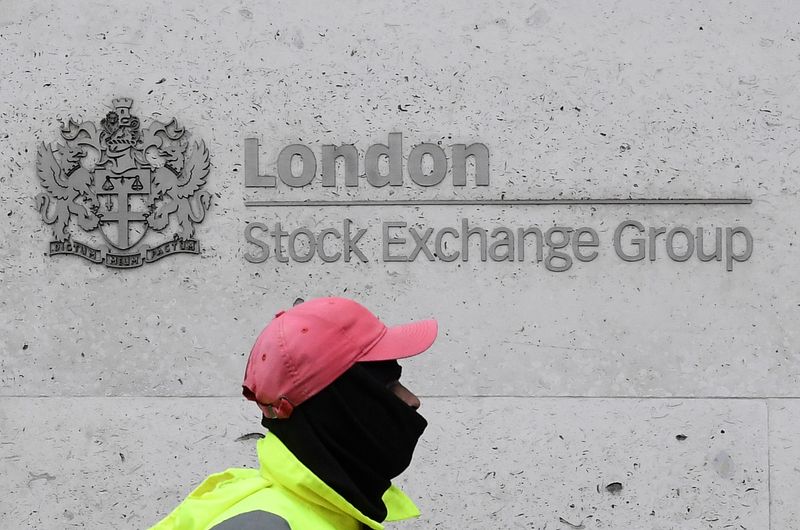By Ritvik Carvalho
LONDON (Reuters) - Global stocks plunged into a bear market and oil slumped on Thursday after U.S. President Donald Trump banned travel from Europe to stem the spread of coronavirus, threatening more disruption to the world economy.
With the pandemic wreaking havoc on the daily life of millions, investors were also disappointed by the lack of broad measures in Trump's plan to fight the virus, prompting traders to bet on further aggressive easing by the U.S. Federal Reserve.
"He (Trump) did not announce any new concrete measures such as a large-scale payroll tax cut to buffer the economy against the impending coronavirus slowdown," said Jeffrey Halley, senior market analyst at OANDA.
"That has probably disappointed markets more than anything."
European shares (STOXX) plummeted to their lowest in almost four years, with the benchmark STOXX 600 index falling 6% by midday in London. Travel and leisure stocks shed 9.9%, hitting their lowest in more than six years. (SXTP)
The falls pushed the MSCI All-Country World Index (MIWD00000PUS), which tracks stocks across 49 countries, into bear market territory, down 20% from its 52-week peak.
The index was down over 2% on the day.
Investors also rushed into safe-haven assets, from bonds to gold to the yen and the Swiss franc. Bitcoin plunged 25%, amid wild volatility in cryptocurrency markets.
U.S. S&P 500 futures (ESc1) plummeted as much as 5% in European trading hours, a day after the S&P 500 (SPX) lost 4.89%, leaving the index on the brink of entering bear market territory, defined as a 20% fall from a recent top.
The VIX volatility index (VIX) -- Wall Street's "fear gauge" -- and an equivalent measure of volatility for the Euro Stoxx 50 (V2TX) hit their highest levels since the 2008 financial crisis.
Japan's Nikkei (N225) crumbled 4.4% to a trough last seen almost three years ago, while MSCI's broadest index of Asia-Pacific shares outside Japan (MIAPJ0000PUS) fell 5%.
Australian shares (AXJO) plunged 7.4% to their lowest level in more than three years while Seoul's Kospi (KS11) fell 4.8% to 4-1/2-year lows, with massive selling prompting a brief trade halt. Thai shares (SETI) sank 10.8% to eight-year lows.
Trump announced on Wednesday the United States will suspend all travel from Europe, except the United Kingdom and Ireland, to the United States for 30 days starting on Friday. He said trade will not be affected by the restrictions.
Trump also announced some other steps, including instructing the Treasury Department to defer tax payments for entities hit by the virus.
"The travel ban from Europe has definitely taken everyone by surprise," said Khoon Goh, head of Asia Research at ANZ in Singapore.
"Already we know the economic impact is significant, and with this additional measure on top it's just going to multiply the impact across businesses. This is something that markets had not factored in ... it's a huge near-term economic cost."
In the money market, traders further raised expectations of another U.S. rate cut, even after the Fed's emergency cut last week.
Fed fund rate futures are now pricing in a large possibility of a 1.0 percentage point cut, rather than 0.75, at a policy review on March 17-18.
PANDEMIC
The World Health Organization (WHO) described the outbreak as a pandemic for the first time on Wednesday.
The highly infectious coronavirus that shut down most of China for much of February is spreading rapidly in Europe and increasingly in the United States, disrupting many corners of life from education to sports, entertainment and dining.
Investors worry how much of an effect policies can have in turning around the global economy given the restrictions on daily life, travel and business.
A case in point was Britain, where the FTSE stock index (FTSE) hit near four-year lows on Wednesday as investors doubted whether the $39 billion government spending plan and 0.5 percentage point Bank of England rate cut announced on Wednesday would be enough to counter the shock from the outbreak.
The index fell even further on Thursday, down 5.75%.
The British pound last stood at $1.2722 , down 0.6% on the day.
Gold fell 0.6% to $1,624.16 per ounce but still stood well below Monday's high above $1,700.
The 10-year U.S. Treasury yield fell to 0.6861% (US10YT=RR) -- still above a record low of 0.318% touched on Monday. The two-year yield (US2YT=RR) fell to 0.3898%, but stood well above Monday's low of 0.251%.
In commodities, oil prices were also hit, compounded by an intensifying price war between Saudi Arabia and Russia, on top of fears of a sharp slowdown in the global economy.
U.S. West Texas Intermediate (WTI) crude (CLc1) shed 6.06% to $30.98 per barrel. Brent crude fell 6.5% to $33.46. (LCoc1)
Copper, seen as a gauge of global economic health because of its wide industrial use, fell to over three-year lows. [MET/L]
In the currency market, the dollar slid against the safe-haven yen and Swiss franc.
The U.S. currency fell 0.89% to 103.60 yen and lost 0.14% to 0.9366 francs .
The euro traded at $1.1243 (EUR=), down 0.2% ahead of the European Central Bank's policy meeting later in the day.

The ECB is all but certain to unveil new stimulus measures, including new, ultra-cheap loans for banks to pass on to small and medium-sized firms.